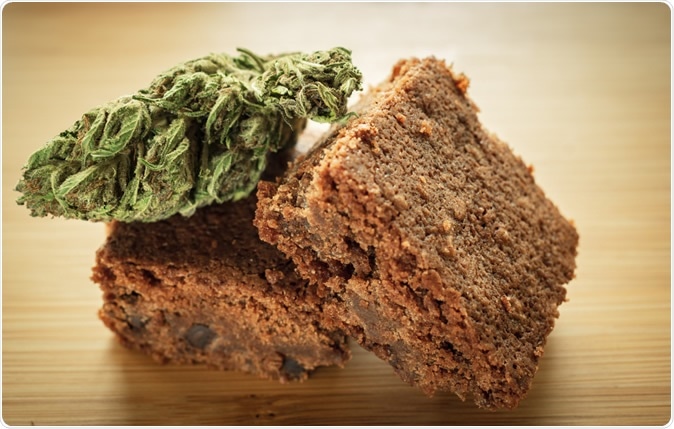Researchers have studied the effects of Δ9-tetrahydrocannabinol or THC in food albeit in mice. THC is the main component that causes the psychological features seen with use of marijuana. Laboratory mice were given dough containing THC and the effects of the concoction were studied on them. This was an attempt to see similar effects in humans after consuming marijuana laced edibles.
According to researchers, this is the first study that looks at the voluntary consumption of marijuana laced food in animals to mimic the use of this drug in humans. The study results were reported in the journal Drug and Alcohol Dependence. The study was titled, “Self-administration of edible Δ9-tetrahydrocannabinol and associated behavioural effects in mice.”

Marijuana and marijuana infused edibles brownies. Image Credit: Marshall Pittman / Shutterstock
The team of researchers from the IUPUI and Indiana University Bloomington explained that the mice that consumed dough laced with THC tended to become less active and their body temperature also was lowered after consumption of edible THC. First author of the study Michael Smoker, who is also an addiction neuroscience PhD candidate explained that gender of the animal was also a determining factor in the effects of edible THC. Smoker is part of the team working in the lab of lead author of the study, Professor Stephen Boehm II from IUPUI. Smoker is part of the Purdue University program on addiction neuroscience at IUPUI. The study was co-authored by Ken Mackie from the Department of Psychological and Brain Sciences and the Gill Center at IU Bloomington, Christopher Lapish from the Department of Psychology and the Indiana Alcohol Research Center at IUPUI and Stephen Boehm II from the Department of Psychology and the Indiana Alcohol Research Center at IUPUI.
Smoker explained that when they offered the dough with THC to the mice, they seemed to be voluntarily choosing to eat the dough with the THC repeatedly. This repetitive self administrative behaviour was well observed among the mice he said. The dough they were provided was made up of flour, sugar, salt and glycerol and contained increasing dose of THC in them.
The mice were given access to the dough containing THC of the range between 1 to 10 mg/kg. The activity of the mice following consumption of the dough was assessed using special devices in their cages. Their locomotor activity, body temperature and sensitivity to pain was assessed after the THC consumption. The actual effects of the THC on their brains were tested at the CB1 receptions in their brain. For this the mice were given specific CB1 receptor blocker called SR141716A. The effects of the THC were found to be diminished after the use of the blocker.
According to Smoker it is an important study because marijuana laced food is soon becoming a reality for humans. This, he added, was due to the legalization of marijuana in several of the United States. He added, “People can buy cookies, candies and all sorts of things with THC in them. Back in the day, you had to make your own brownies, or something like that, and now they are becoming more widely available and increasing in popularity.”
According to Smoker, there are several adverse effects or side effects of consuming marijuana in edible forms. He said that most people are unaware of these side effects. He added that edibles containing marijuana may have higher concentrations of THC compared to plant marijuana and there is a risk of overdose.
The authors write in conclusion, “In contrast to other cannabinoid self-administration models, edible THC is relatively low in stress and uses a route of administration analogous to one used by humans. Potential applications include chronic THC self-administration, determining THC reward/reinforcement, and investigating consequences of oral THC use.”
Some of the research questions that the team tried to answer were the immediate and long term effects of these marijuana edibles, sudden withdrawal of these edibles and their effects and accidental consumption of these edibles by children. It has been seen that these marijuana laced edibles are habit forming with the mice voluntarily self administering the dough with THC of higher doses. They are unable to test the effects of these edibles on humans because of ethical constraints, the team explained, and thus had to resort to mice to show the effects of these edibles. According to Smoker, this is the first study that has shown the self administrative behaviour of these marijuana containing edibles in lab mice. He explained that this drug-seeking behaviour of humans has been difficult to replicate in earlier experiments.
Journal reference:
Michael P. Smoker, Ken Mackie, Christopher C. Lapish, Stephen L. Boehm, Self-administration of edible Δ9-tetrahydrocannabinol and associated behavioral effects in mice, Drug and Alcohol Dependence, Volume 199, https://doi.org/10.1016/j.drugalcdep.2019.02.020., http://www.sciencedirect.com/science/article/pii/S0376871619301127